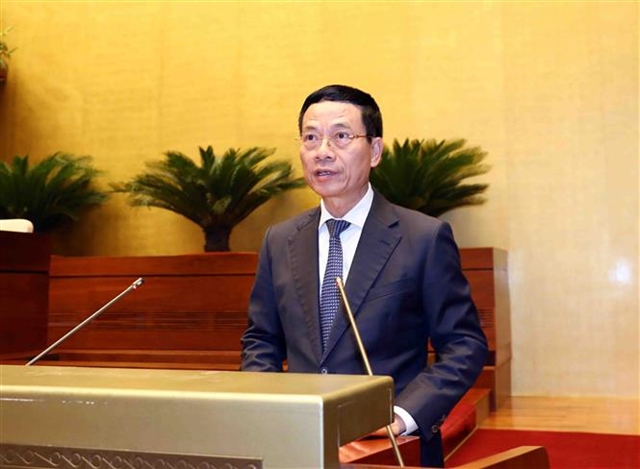 Politics & Law
Politics & Law

 |
| Minister of Information and Communications Nguyễn Mạnh Hùng speaks at the session. VNA/VNS Photo |
HÀ NỘI — The amendment to the Law on Telecommunications aims to promptly address requirements of the fourth industrial revolution, fulfill international commitments and ensure consistency and synchronisation with government regulations, National Assembly (NA) deputies were told yesterday.
It also aims to overcome the inadequacies, difficulties and obstacles encountered during previous implementations of the law.
In his report to the NA, Minister of Information and Communications Nguyễn Mạnh Hùng said the Law on Telecommunications from 2009 has significant implications for the overall economic development and integration process, particularly in the telecommunications industry. The law also marked a new milestone in the country's telecommunications legislation, especially in the face of globalisation.
After more than 12 years of implementation, the law and its accompanying regulations have established a legal framework that promotes competition and enables businesses to participate in the market.
However, despite the achievements, the current Law on Telecommunications has revealed limitations and inadequacies that are not suitable for the evolving context. Consequently, a comprehensive amendment is necessary to establish a suitable legal framework that aligns with the new requirements and addresses obstacles encountered during the state's implementation and management, Hùng said.
The primary purpose of formulating the law is to make it fully institutionalised and in compliance with the Party's policy of developing a market economy with state regulation in telecommunications activities. It also aims to develop telecommunications infrastructure and other related infrastructure to lay the foundation for the development of the digital economy and digital society.
The amendment aims to address institutional issues, policy gaps, and inadequacies in the provisions of the 2009 Law on Telecommunications and other related legal regulations. These issues have been hindering the development process. The amendment also seeks to ensure the consistency, synchrony, and feasibility of the law within the legal system, in line with Việt Nam's international commitments. Moreover, it aims to simplify administrative procedures.
Simultaneously, it aims to supplement regulations that align with the trends in telecommunications development, convergence, and the establishment of digital infrastructure for the digital economy.
The current draft law consists of 10 chapters and 74 articles that cover regulations on telecommunications activities, the rights and obligations of organisations and individuals engaged in such activities, and state management of telecommunications.
Upon reviewing the bill, the Chairman of the NA's Committee for Science, Technology, and Environment of the National Assembly, Lê Quang Huy, said he generally agreed with the need to promulgate the amended Law on Telecommunications for the reasons mentioned in the Government's report.
The Committee for Science, Technology, and Environment has said that, overall, the content of the draft Law is in line with the guidelines and principles of the Party and the provisions of the Constitution. The draft Law appropriately inherits the provisions of the current Law on Telecommunications while introducing new regulations and making necessary amendments to address practical shortcomings.
However, it is recommended that the drafting agency continues to review the draft law and other relevant laws in the field of information and communication from a legal perspective, ensuring consistency and synchronisation within the legal system.
Furthermore, the Committee proposed a thorough review to ensure uniformity and coherence between this draft law and other draft laws currently under consideration and approval by the NA, such as the amended Land Law, Law on Protection of Consumer Rights, Law on Citizenship Identity, Law on Prices, and Law on Bidding.
Regarding compatibility with relevant international treaties to which Việt Nam is a contracting party, Huy said most of the contents of the draft law are consistent with the relevant international treaties that Việt Nam has ratified.
The deputies earlier in the day voted to approve a resolution on the 2024 law and ordinance building programme and adjustment to a similar programme for 2023. They also discussed the draft law amending and supplementing a number of articles of the Law on People's Public Security Forces.
Deputies also listened to reports on the draft revised law on citizen identification and will draft laws on amendments to a number of articles on the exit and entry of Vietnamese citizens, and of the law on foreigners' entry into, exit from, transit through, and reside in Việt Nam.
Notably, the draft law amending seven articles and clauses of the law on foreigners' entry into, exit from, transit through, and residence in Việt Nam focuses on creating further favourable conditions for foreigners’ entry and exit and managing their residence serving the protection of national security and ensuring social order and safety. VNS




